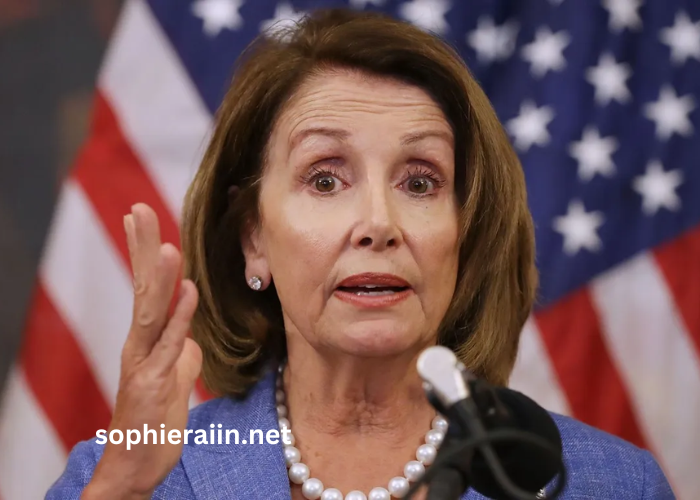Nancy Pelosi, a prominent figure in American politics, has long been recognized for her influential role as Speaker of the United States House of Representatives. Beyond her political career, Pelosi has garnered attention for her substantial wealth and savvy investment strategies. As of 2024, Pelosi’s net worth has been a topic of much speculation and discussion, given her significant financial holdings and real estate investments. This article will explore Nancy Pelosi’s net worth, delve into her investment portfolio, and examine the various factors that have contributed to her financial success.
Early Life and Political Career
Nancy Pelosi was born on March 26, 1940, in Baltimore, Maryland, into a politically active family. Her father, Thomas D’Alesandro Jr., served as a U.S. Congressman and Mayor of Baltimore, which exposed Pelosi to politics from an early age. She graduated from Trinity College in Washington, D.C., with a degree in political science and later moved to San Francisco, where she became involved in local Democratic Party politics.
Pelosi’s political career took off when she was elected to the U.S. House of Representatives in 1987, representing California’s 8th congressional district, which includes much of San Francisco. Over the years, Pelosi climbed the ranks within the Democratic Party, eventually becoming the first woman to serve as Speaker of the House in 2007, a role she held until 2011, and then again from 2019. Her leadership positions and long-standing service in Congress have provided her with a platform to influence national policies and play a key role in the legislative process.
Sources of Nancy Pelosi’s Wealth
While Nancy Pelosi’s public service has been a significant aspect of her life, much of her wealth can be attributed to her husband, Paul Pelosi, a successful businessman and investor. Paul Pelosi is the owner of Financial Leasing Services, Inc., a venture capital investment and real estate company based in San Francisco. His business ventures have been instrumental in building the Pelosi family’s wealth, which is estimated to be substantial.
1. Stock Market Investments
One of the primary sources of Nancy Pelosi’s wealth is stock market investments. Over the years, the Pelosi family has made numerous investments in publicly traded companies, including technology giants like Apple, Microsoft, Amazon, and Facebook. Paul Pelosi’s expertise in finance has allowed the family to make strategic investment choices that have yielded significant returns.
Pelosi’s financial disclosures reveal that her portfolio includes stocks, options, and mutual funds, reflecting a diverse and well-managed investment strategy. The couple’s involvement in high-profile stock trading has attracted media attention, leading to discussions about the ethical implications of lawmakers trading stocks. Despite these discussions, there is no evidence of any illegal activity, and Pelosi has consistently maintained that her investment decisions are independent of her legislative duties.
Real Estate Holdings
Real estate is another significant contributor to Nancy Pelosi’s net worth. The Pelosi family owns several properties, including a mansion in the exclusive Pacific Heights neighborhood of San Francisco, valued at over $20 million. This luxurious home boasts panoramic views of the city and the Golden Gate Bridge, emphasizing the Pelosi family’s taste for prime real estate.
In addition to their San Francisco home, the Pelosis own a vineyard in Napa Valley, California, which is estimated to be worth between $5 million and $25 million. This property not only serves as a private retreat but also operates as a working vineyard, adding to the family’s income streams. Pelosi’s real estate portfolio extends to other properties as well, including a townhouse in Washington, D.C., and commercial real estate investments.
3. Private Equity and Venture Capital Investments
Paul Pelosi’s background in venture capital has played a crucial role in the family’s wealth accumulation. Through Financial Leasing Services, the Pelosi family has invested in various private equity and venture capital projects. These investments often include early-stage companies with high growth potential, particularly in the technology and green energy sectors.
The success of these investments is attributed to strategic choices and a keen understanding of market trends. The Pelosi family’s involvement in venture capital provides them with opportunities to invest in innovative companies before they go public, allowing for substantial returns when these companies succeed.
4. Income from Public Speaking and Book Deals
As a high-profile political figure, Nancy Pelosi has also earned income from public speaking engagements and book deals. Her leadership role in the House of Representatives and her influence in shaping U.S. policy have made her a sought-after speaker. Pelosi’s speaking engagements at universities, conferences, and political events provide additional sources of income.
In 2021, Pelosi released her autobiography, “Know Your Power: A Message to America’s Daughters,” which offered insights into her life, career, and political journey. The book’s sales added to her income and further solidified her status as a prominent public figure.
Estimating Nancy Pelosi’s Net Worth in 2024
As of 2024, Nancy Pelosi’s estimated net worth is reported to be between $120 million and $150 million. This substantial net worth makes her one of the wealthiest members of Congress. The bulk of Pelosi’s wealth is tied to her investment portfolio, real estate holdings, and her husband’s successful business ventures.
Pelosi’s financial disclosures, which are required for all members of Congress, indicate a diverse range of assets, including stocks, bonds, real estate, and business interests. The exact value of her net worth fluctuates with market conditions, the performance of her investments, and the appreciation of her real estate properties.
Controversies and Public Perception
As one of the most powerful politicians in the United States, Nancy Pelosi’s wealth has not escaped scrutiny. Her investment activities have sparked debate about potential conflicts of interest, especially when it comes to stock trading by members of Congress. Critics argue that lawmakers may have access to non-public information that could influence their investment decisions, leading to calls for stricter regulations on stock trading by government officials.
In response to these concerns, there have been legislative efforts to restrict or ban stock trading by members of Congress and their immediate families. Pelosi herself has supported efforts to enhance transparency and accountability in Congress, though she has faced criticism for not advocating more stringent reforms on stock trading by lawmakers.
Despite these controversies, Pelosi remains a respected figure in the Democratic Party, admired for her political acumen, leadership skills, and commitment to public service. Her financial success, while a topic of public interest, has not overshadowed her contributions to politics and her role in shaping legislative priorities.
Nancy Pelosi’s Philanthropy and Charitable Contributions
In addition to their wealth, the Pelosi family has a history of philanthropic activities. Nancy and Paul Pelosi have supported various charitable organizations, focusing on education, health care, and social justice initiatives. Their philanthropic efforts reflect a commitment to giving back to the community and supporting causes that align with their values.
The Pelosi’s have donated to educational institutions, including colleges and universities, to support scholarships and educational programs. They have also contributed to healthcare organizations and initiatives aimed at improving access to medical care for underserved populations. Their charitable work is an extension of Nancy Pelosi’s public service, emphasizing a dedication to making a positive impact on society.
The Future of Nancy Pelosi’s Wealth and Legacy
As Nancy Pelosi continues to serve in the U.S. House of Representatives and maintain her leadership role, her influence in American politics remains strong. Her financial success, coupled with her political power, ensures that she will continue to be a prominent figure in public life.
Looking ahead, Pelosi’s wealth is likely to remain substantial, supported by ongoing investment income, real estate appreciation, and potential new business ventures. Her legacy will be defined not only by her political achievements but also by her financial acumen and philanthropic contributions.
Conclusion
Nancy Pelosi’s net worth, estimated between $120 million and $150 million in 2024, is a testament to her financial savvy and the success of her investment strategies. While her wealth has attracted public attention and sparked debate, it is also a reflection of her and her husband’s strategic business decisions and investment acumen.
Pelosi’s financial success has enabled her to support various charitable causes, furthering her impact beyond the realm of politics. As a powerful figure in American politics, her influence extends across both the legislative and financial landscapes, underscoring her role as a leader who has navigated the complexities of public service and private wealth with determination and skill.
Nancy Pelosi’s story is one of political influence, financial success, and commitment to public service, providing a multifaceted view of a woman who has shaped the course of American politics while building a lasting legacy of wealth and philanthropy.



